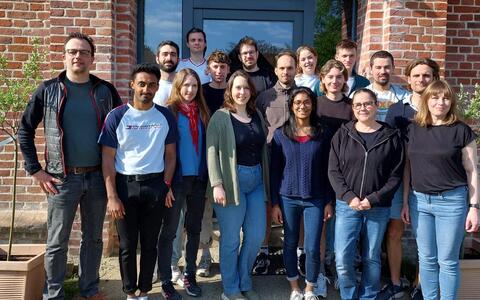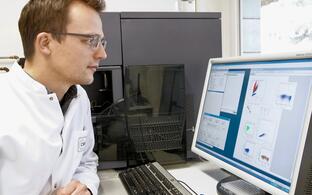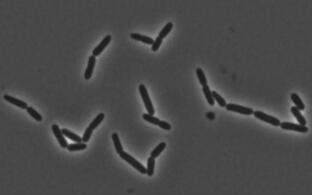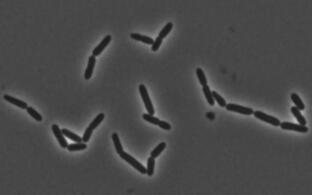
Wilck Lab
Immune-microbial dynamics in cardiorenal disease
Profile
In this context, arterial hypertension and chronic kidney damage are of particular interest, as both diseases are associated with an increased cardiovascular risk. We combine different model systems with exploratory and interventional clinical trials to understand this interaction. We aim to use our findings to develop novel therapeutic approaches that reduce cardiovascular risk by modulating the bacteria-host interaction.
We are a translational research team consisting of clinician scientists, basic scientists and nutritionists and are located at the Experimental and Clinical Research Center (ECRC). As a clinician scientist, Nicola Wilck combines his clinical work at the Division of Nephrology and Internal Intensive Care Medicine at the Charité-Universitätsmedizin Berlin with research at the ECRC.
As a junior research group we are funded by the Corona Foundation in the German Stifterverband. We are supported by the European Research Council (ERC) under the European Union’s Horizon 2020 research and innovation program (ERC Starting Grant).
Team
Group leader
Nicola Wilck, MD
Clinical affiliation: Medical Department, Division of Nephrology and Internal Intensive Care Medicine, Charité - Universitätsmedizin Berlin.
Email: nicola.wilck@charite.de; nicola.wilck@mdc-berlin.de
ORCID: https://orcid.org/0000-0003-3189-5364
Scientists
Victoria McParland, PhD
Email: victoria.mcparland@charite.de
ORCID: https://orcid.org/0000-0003-0731-3272
Hendrik Bartolomaeus, MD
Email: hendrik.bartolomaeus@charite.de
ORCID: https://orcid.org/0000-0003-4288-3828
Felix Behrens
Email: felix.behrens@charite.de
ORCID: https://orcid.org/0000-0002-6841-4192
Clinician scientists
Johannes Holle, MD
Clinical affiliation: Department of Pediatrics, Division of Gastroenterology, Nephrology and Metabolic Medicine, Charité - Universitätsmedizin Berlin.
Email: johannes.holle@charite.de
István András Szijártó, MD, PhD
Clinical affiliation: Medical Department, Division of Nephrology and Internal Intensive Care Medicine, Charité - Universitätsmedizin Berlin.
Email: istvan-andras.sziarto@charite.de
Arne Thiele, MD/PhD
Clinical affiliation: Medical Department, Division of Nephrology and Internal Intensive Care Medicine, Charité - Universitätsmedizin Berlin.
Email:arne.thiele@charite.de
ORCID: https://orcid.org/0000-0003-0786-2239
Technical assistant
Gudrun Koch
Email: gudrun.koch@charite.de
Melanie Röhr
Email: melanie.roehr@charite.de
PhD, MD and MD/PhD students
Ariana Rauch, M.Sc.
Email: ariana.rauch@charite.de
Alejandro Gallego Yarritu, M.Sc.
Email: alejandro.yarritu-gallego@charite.de
Harithaa Anandakumar, M.Sc.
Email:harithaa.anandakumar@charite.de
Wibke Anders, Pharmacist
Email: wibke.anders@charite.de
Olena Potapenko, M.Sc.
Email: olena.potapenko@charite.de
Moritz Wimmer
Email: moritz.wimmer@charite.de
Frederick Gerritzmann
Email: frederick.gerritzmann@charite.de
Julia Schlender
Email: julia.schlender@charite.de
Valentin Vecera
Email: valentin.vecera@charite.de
Franziska Fuckert
Email: franziska.fuckert@charite.de
Natnael Gebremedhin
Email: natnael.gebremedhin@charite.de
Paul Bonnekoh
Email: paul-moritz.bonnekoh@charite.de
Associated researchers
Lucas Stürzbecher
Strauß Lab, Experimental Ophthalmology, Charité - Universitätsmedizin Berlin.
Email: lucas.stuerzbecher@charite.de
Research Projects
Microbial dynamics in chronic kidney disease
In this project funded by the Corona Foundation (Corona-Stiftung im Deutschen Stifterverband) we aim to understand the role of the gut microbiota in mediating effects of chronic kidney disease (CKD) on cardiovascular disease (CVD). CKD and inflammation are known risk factors for CVD. The microbiota influences CKD and CVD as well as inflammation, and could be an important mechanistic link. In this project we aim to better understand the function and dynamics of the gut microbiota and associated immunophenotypes in patients with end-stage renal disease (ESRD). Using a multi-omics, translational approach we aim to better define the influence of the microbiome on CVD and to identify novel targets for the prevention and treatment of CVD in CKD. The focus of this project is
1) to better define the composition, function and the main influencing factors of the gut microbiome in ESRD over time
2) to correlate microbiome composition and bacterial metabolites with immunophenotypes and clinical parameters.
3) identify potential microbiome-driven risk and protection patterns in ESRD patients4) quantify the contribution of the ESRD microbiome to CVD in experimental models.
HyperBiota
In this ERC-funded project we investigate the relationship of nutrition, the gut microbiome and immune system in the context of arterial hypertension. Hypertension damages organs such as the kidney, thereby leading to premature death. Beyond elevated blood pressure, hypertension is characterized by a pro-inflammatory immune response ahead of measurable organ damage. Activated immune cells infiltrate the kidney to cause tissue injury. However, inflammation is insufficiently addressed by today’s drugs. Current treatments do not include the gut microbiota, its metabolites and the associated lymphoid tissue – the largest immune cell reservoir in the body. With our research we aim to characterize this missing link and move towards microbiota-based therapeutic strategies. We have recently shown for the first time that variations in dietary salt intake promote hypertension by modulating the immune system via the microbiota and its metabolites. Thus, the diet-microbiota axis is an important modulator of the immune response in hypertension. The vision behind Hyperbiota includes a personalized, microbiome-guided immunonutrition to reduce inflammation and modulate the immune response in such a way as to reduce organ damage associated with hypertension. By using an interdisciplinary approach, we will address the following:
1) the reciprocity of dietary composition, microbial community structure and metabolism, and immune response in hypertension in order to guide targeted interventions.
2) the changes in microbial ecology and immune cell homeostasis associated with worsening kidney function.
3) the extent to which the gut-associated lymphoid tissue contributes to the immune response in hypertension and its responsiveness to targeted interventions.
4) Knowledge gained in model systems will be translated and verified in mice associated with human microbial communities.
CRC 1365 - Renoprotection
https://nephroprotektion.charite.de/en/
CRC 1470 - HFpEF
Publications
Please find our most recent publications on PubMed.
News
Interested?
Looking for thesis project in an interdisciplinary lab with a strong translational focus? We are always looking for interested life science and medical students!
Drop us an email at nicola.wilck@charite.de / hendrik.bartolomaeus@charite.de








